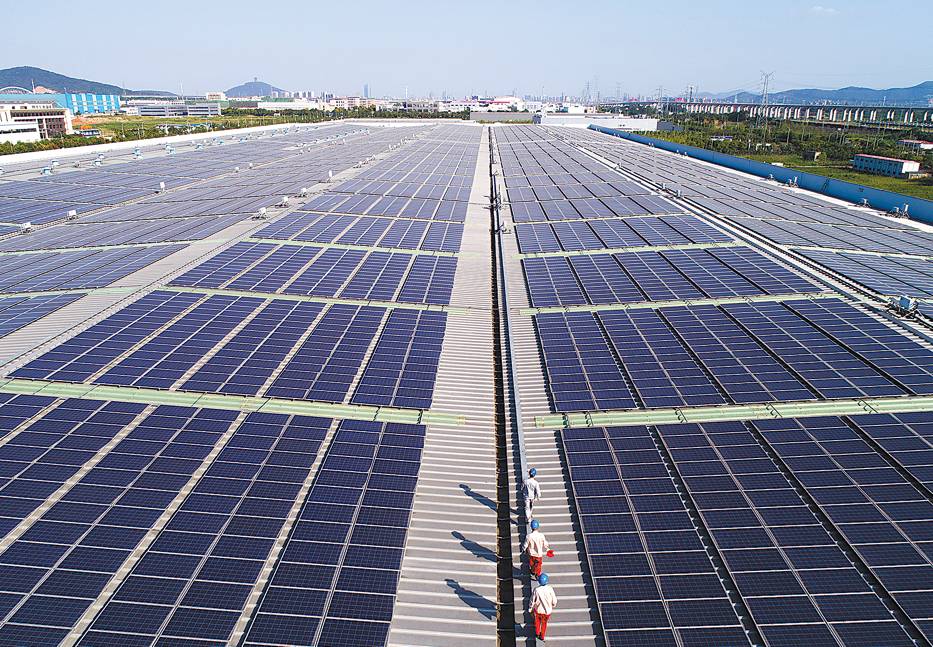Nation playing crucial role on climate change
Key efforts made on mitigation, energy conservation
By WANG MINGJIE in London | China Daily Global | Updated: 2019-12-16 10:09

Editor's note: In "Footprint", a series of stories recalling important examples of China interacting with the rest of the world, we follow the country's path over the past seven decades. This is part of the series.
The extent of fires raging across the globe this year has grabbed the attention of scientists and raised eyebrows worldwide.
In Australia, many areas have experienced devastating bush fires that have already left six people dead and destroyed hundreds of properties.
Elsewhere, vast tracts of land have been shrouded in smoke, with flames burning huge swaths of forests in the US state of California and in Greece, Spain, Russia, France, Indonesia and some African nations.
While scientists cannot attribute any single fire directly to climate change, it is clear that the extent and severity of wildfires in recent years are closely linked to global warming.
Stefan H. Doerr, professor of geography at Swansea University in Wales and editor-in-chief of the International Journal of Wildland Fire, said: "Climate change has increased the probability of extreme fires in many parts of the world. Simply, the frequency of these extreme conditions and their magnitude is increasing due to climate change.
"We are now seeing fire behaviors that we really have not seen so extensively in recent years," Doerr said. "In many places, fires are becoming larger and more destructive."
Man-made global warming has also led to rising sea levels, intense hurricanes and strong storms. According to a report from the charity Save the Children, "climate shocks" are threatening 33 million people in East and Southern Africa with cyclones and droughts.
Climate change is now regarded as one of the greatest challenges facing humanity, and the key to addressing the issue is to reduce greenhouse gas emissions.
A goal to keep global warming to below 2 C was agreed by the participating countries at the 2015 Paris Climate Conference, at which China was widely seen as a major player in concluding the accord.
Anthony Cox, deputy director of environment at the Organisation for Economic Cooperation and Development, or OECD, said, "This was the first time that China had really put its huge power behind the goal of climate change."
On Nov 30, 2015, President Xi Jinping put forward China's position on addressing global climate change challenges at the 21st Conference of the Parties, also known as COP21, in Paris. He pledged to peak carbon dioxide emissions by 2030 and to raise the share of non-fossil fuels to 20 percent in primary energy consumption.
Anna-Kaisa Itkonen, European Commission spokeswoman on climate change, said China's commitments in the French capital were "absolutely vital" to the Paris agreement and inspired other nations to follow suit.
"In international climate diplomacy as well as climate action globally, China plays an absolutely crucial role, and this is one of the reasons the European Union has sided with China. For us, it's very important to have China as a partner in our climate action work," she said.
The country has come a long way to play a leading role in global climate change cooperation. It was not until the early 1980s that environmental protection became a basic Chinese government policy. Since then, significant efforts have been made in working toward climate change mitigation and promoting energy conservation.
During a meeting of the Intergovernmental Negotiating Committee for a Framework Convention on Climate Change in 1991, China was opposed to the idea of targets, and supported a general framework convention with no specific responsibilities.
Ksenia Chmutina, a senior lecturer at Loughborough University in the United Kingdom, said in a report titled China's Participation in Global Climate Change Cooperation that from the 1980s to the post-Kyoto era, China has been successful in establishing a unified front for developing countries in order to resist any singling out of such nations' commitments by developed countries.
The Kyoto Protocol, reached in the Japanese city in 1997, set specific emissions reduction targets for each industrialized nation. More than 100 developing countries, including China and India, were exempted from the treaty.
Pan Jiahua, director of the Institute for Urban and Environmental Studies at the Chinese Academy of Social Sciences, said, "The Kyoto Protocol did not bring any real pressure on China after it came into effect, but it did have a huge impact on China's future climate negotiations."
At the 2009 United Nations Climate Change Conference in Denmark, commonly known as the Copenhagen Summit, China expressed quiet satisfaction at the outcome of the talks, which clarified the obligations of developed and developing countries and actions they should take according to the principle of "common but differentiated responsibilities".

China's efforts on global climate mitigation negotiations hit the headlines at the 2015 World Climate Change Conference in Paris, where the country was hailed as a "constructive shaper" of the process.
Cox, from the OECD, who attended the meeting, said, "The mood at the whole conference was one of tremendous optimism … and the fact that China came on board and showed leadership, I think had a very unifying effect on the conference."
By playing a more active role in global efforts to mitigate climate change, experts believe China has much to gain and little to lose.
Karl Hallding, senior research fellow at the Stockholm Environment Institute in Sweden, said, "A growing global focus on low-carbon economic development provides opportunities for China to gain competitiveness, international reputation and environmental benefits, at the same time as it lays the foundation for more-balanced economic and social development."
While Xi's speech in Paris was important in reaffirming China's commitment to what became the Paris process, the key step was the joint statement made by him and United States president Barack Obama in Beijing on Nov 12, 2014, where both countries asserted that climate change is "one of the greatest threats facing humanity" and committed to their national targets.
However, on becoming US President, Donald Trump reversed his predecessor's policy toward climate change. On June 1, 2017, Trump announced that the US would cease all participation in the 2015 Paris agreement, claiming the Paris climate accord, which has been signed by more than 190 countries, would hurt the US economy with job losses.
Despite US House of Representatives Speaker Nancy Pelosi attending the UN Climate Change summit, also known as COP25, in Madrid this month, environmentalists want to see concrete steps being taken by the US government.
Jean Su, energy director of the Climate Law Institute at the Center for Biological Diversity in Tucson, Arizona, said in an interview with the BBC before the summit, "While it's great that Speaker Pelosi is coming to Madrid in place of Trump, symbolic gestures are no substitute for bold action.
"America remains the No 1 historic contributor to the climate emergency, and even Democratic politicians have never committed to taking responsibility for our fair share," she said.
With the US exiting the Paris agreement, the global community is looking to China to help fill the leadership gap in international climate politics. Despite being the largest emitter in the world, the country is leading the way in developing renewable energy. It has more solar panels and wind turbines than any other country, and last year more electric vehicles were sold in China than in the rest of the world combined.
Cox believes that China has a huge opportunity to lead the world in driving the transition to a low-emission, climate-resilient economy. "A policy focus on harnessing the benefits from innovation will be essential to driving the structural changes and emissions reductions that will help achieve the global climate goals," he said.
However, China's path toward a stronger economy that is less dependent on coal has never been straightforward, and the huge pressure to cut carbon emissions while maintaining stable economic growth could affect its battle against global warming.
Last year, China's carbon emissions intensity-emissions per unit of GDP-fell by 45.8 percent compared with 2005, and it has already fulfilled its promise that by next year such intensity would fall by 40 to 45 percent compared with 2005.
Given the overall positive trend, challenges still remain. According to Global Carbon Budget, which tracks carbon dioxide emissions worldwide, China's carbon emissions have risen in the past three years after falling for several years.
Sharon George, a climate change expert at Keele University in the UK, said, "China needs to act urgently if it is going to meet its commitments and reduce the use of coal-fired power production, which provides around three-quarters of its electricity."
While taking into consideration the historical differences between developed and developing countries, some academics argue that it would be unjust to seek to meet climate targets by restricting the development of nations such as China, where there is evidence of significant improvements in energy efficiency.
Neil Hirst, a senior policy fellow at the Grantham Institute for Climate Change and the Environment at Imperial College London, said that while still facing challenges in developing the economy and improving people's livelihoods, China has moved from heavy industry toward lighter-and-higher-value industries and services that are less energy intensive.
He underlined that the nation has already achieved and far surpassed most of its climate targets to cut carbon intensity by 40 to 45 percent between 2005 and next year, well ahead of schedule, adding, "China's rapid economic growth has created room for big investments in solar and wind power, and electric vehicles."
Hirst, author of The Energy Conundrum: Climate Change, Global Prosperity, and the Tough Decisions We Have to Make, said he believes China can lead the way in showing how economic development and emissions reduction can work in tandem, and he expects that it will successfully implement its Paris commitments.
The Paris agreement provided the foundation for emissions reductions, but at the COP25 meeting in Madrid this month and at COP26 in Glasgow, Scotland, next year, nations will need to come together to realize their ambitions.
Wendel Trio, director of Climate Action Network Europe, said, "In 2015, it was China and the US that both got a lot of attention and credit, but in Glasgow if it really succeeds, I think China will be the one."
























